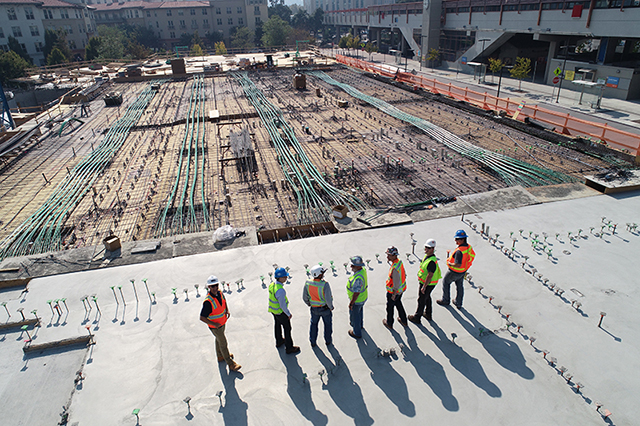
As any architect knows, although it is vitally important, contract administration (CA) is rarely the fun part of any project and is often greeted with similar levels of enthusiasm as when one is called up for jury duty. In our experience, there are two reasons why architects dread the many chores associated with CA. First off, no architect goes into the profession because they love paperwork – the thrills are in the creative design process, and that’s why most architects went into the profession in the first place. Secondly, problems in CA, no matter how trivial, can lead to conflict with contractors and project owners, possibly even resulting in lengthy and time consuming litigation.
Experienced architects also know that managing contract administration well is what keeps projects on track, and what supports the continuity, quality, and intent of their original design. When the architect serves as contract administrator, they can also better manage and limit risks by facilitating communications and maintaining clear project records. The architect is also in the best position to identify and correct problems in construction as they occur, and can quickly deal with them to minimize any negative impact on the construction.
For these reasons, and plenty more, CA can be rewarding, a great experience, and help to build lasting and useful relationships with the whole project team including owners, contractors and consultants. What’s key is finding a way to make CA more palatable for all involved.
In their report Construction Contract Administration Software for Architects, the Ontario Association of Architects (OAA) states that in order to do construction contract administration so that it is both time and cost effective,
“… It is essential to either use specialized programs for Contract Administration (CA) or alternatively to develop standard procedures and templates with everyday software.”
Good CA programs enable effective communication and collaboration across project teams, maximizing efficiency, minimizing costs, and generally making life easier for all involved. Staying organized frees up time for the fun stuff, and decreases the risk of costly, and frustrating, errors that can delay projects and cause overruns. Using programs such as Excel, or even Word, to track these important documents (as we are always surprised to learn that many architecture firms still do) really doesn’t compare – there are much more efficient ways to handle contract administration.
Almost every part of the entire supply chain of design and construction is being transformed by digital technologies that include virtual modelling, 3D printing, robotic construction tools, cloud servers and mobile devices. Considering this, it is surprising that CA practises in many firms lag so far behind.
We realize that architects have options when it comes to the programs they choose to help manage contract administration, and much of the report we are referencing in this post is a comparative summary of the programs used by OAA members. Of the programs represented, we are happy to relay that more OAA members use RForm than any other program, and we’d like to summarize the advantages that RForm has over other systems, as recognized in the report.
Everything is in the cloud
Having all your contract administration documents located in the cloud means that everyone on your team, or with a stake in the project, can access the documents that they need at any time, and any location – whether they be flying to Europe, on the job site, or in your office. More than this, if they have the permissions – as granted by prime consultant or architect – they are able to update these documents, whether they be shop drawings, RFIs, minutes of meetings, or any of the many documents attached to each project. Being able to share these files instantly with the project team is a real boon, as is the knowledge that you no longer have to worry if someone only has that one vital document stored on their personal computer, and they are unavailable, or have left the firm.
Full accountability
When changes are made or input is needed to any document, RForm makes it easy to notify other team members by auto-generating an email alert, giving the necessary team members a direct link to the item being referenced. Consequently, it is easy to get straight to what has to be done and deal with it, streamlining the notification process. Every change is logged and tracked, so that you know when requests were made, and when each consultant has reviewed each item.
Increased efficiency
When all your documents are stored in one place, up to date, and changes noted as they happen, communication speeds up. All the documents you need are just one click away in most cases, meaning that you aren’t wasting time trying to work out what is stored where. Plus, there are many features within RForm that make many common processes a whole lot less onerous, such as management of certificates of payment, which can be approved electronically. Also worth noting: Documents are linked – for example once a change order is approved, it is automatically tracked and added to the certificate for payment.
Instant archiving
Once a project is finished, it is easily saved as an archived project on the RForm server, which can be accessed whenever necessary, but also on the consultant’s hard drive meaning that they maintain ownership of all data (should they choose to unsubscribe from the program). Users can do a full download of project data at any time in the project.
Simplicity of use
OAA members reported that RForm had less of a learning curve than other programs that they have used (or continue to use in some cases). We pride ourselves on how simple RForm is to use, and have made videos that explain most functions (and are always happy to provide further support when required).
Great value for money
RForm is one of the cheapest options when it comes to contract administration platforms. Subscribing costs $29.95/month per project, with no limits on the number of people using the program for each project. Once a project has been archived, you’re no longer charged for it. This very reasonable pricing structure makes RForm an excellent solution for smaller offices as well as larger ones.
Designed by an architect to make his fellow architects lives easier, RForm really is an ideal contract administration system, no matter the size of your office, or the size of the projects you are managing.
Want to give RForm a try? Sign up now for a 30 day free trial and if you need any help getting started call us at 1-866-789-6050 or email us at info@rform.

